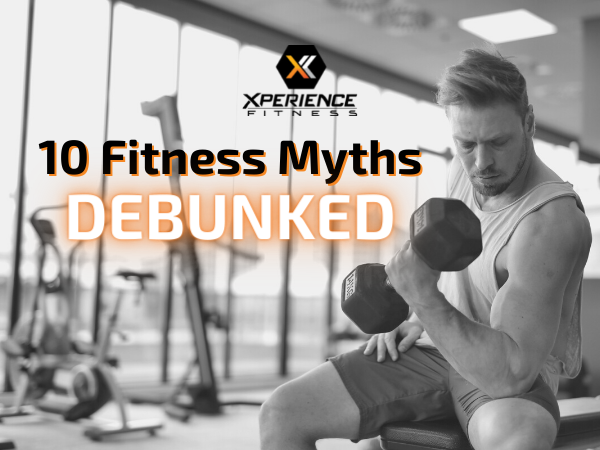If there’s one thing the pandemic taught us, it’s that misinformation runs rampant. The realm of fitness is not immune to that, either. There are some common misconceptions or downright lies you have probably heard. We will put some of those to rest here. Here are 10 fitness myths debunked.
Get Two FREE Weight Loss Sessions
Myth: No pain, no gain
Truth: Being sore after a workout isn’t necessarily a sign of progress nor is it essential for your muscles to grow. Don’t measure the effectiveness of your workout with pain and soreness. Soreness is normal to feel after working out, but severe pain can be a sign of a torn muscle or another serious injury. And if you don’t feel too sore, don’t worry. Barometers like calories burned or average heart rate are much more useful in determining how successful your workout was.
Myth: Cut out fats and carbs
Truth: Many people who are trying to lose weight might instinctively avoid fats and carbs. It’s true that carbs contribute to weight gain, but you don’t need to avoid them at all costs. There are good and healthy carbs that are needed that can be found in whole-wheat bread, barley, quinoa, and oatmeal. Some diets may restrict carb consumption to great lengths, but a normal weight loss diet doesn’t need to be so strict. As for fats, saturated and trans fats are what you should limit. There are very healthy fats found in fish that can actually be extremely beneficial to your health. Other products with healthy fats include olive oil, nuts, and seeds.
Myth: You must stretch before working out
Truth: Stretching beforehand probably won’t harm you, but it isn’t completely necessary. It’s a good idea to warm up for five minutes to make sure your body is loose, but certain kinds of stretching won’t do much for you. Overextension stretches like touching your toes can result in injury more often than it prevents one. If you’re going to stretch, do dynamic stretches that target the body part you’re about to work out just to increase your range of motion, but don’t feel the need to overextend yourself.
Myth: Long workouts are better
Truth: You don’t have to spend an hour and a half at the gym every day in order to hit your goals. In fact, our Team Training classes offer HIIT (high-intensity interval training) which is the most efficient and time-sensitive workout you’ll ever find. In just 40 minutes, you can burn more than 1,000 calories and continue doing so because of a heightened metabolism. It’s not the time you put in that matters, it’s the effort.
Myth: Lifting makes you bulky
Truth: Weight lifting on its own isn’t going to lead to bodybuilder-like muscles. Yes, your muscles will get toned and grow, but you shouldn’t avoid weight lifting because you’re afraid of getting too bulky. Lifting offers plenty of benefits for your health, metabolism, and joints. It also helps your overall energy and strength levels. Don’t skip it when planning out your regimen!
Myth: Detoxing will result in weight loss
Truth: Juice cleanses and other detox methods are popular and while they aren’t necessarily wrong, they might offer false promises. Removing solid foods by way of intermittent fasting can affect your metabolism long term. If your metabolism slows way down, your weight can plateau more easily and cause your body to hold onto its fat more stubbornly.
Myth: Morning workouts are better
Truth: It doesn’t matter when you get your workout in. Some people feel that an early morning workout jumpstarts their metabolism and results in more success. Fitness at any time of day has this benefit. Don’t feel like you have to get up at 4:00 a.m. if you don’t want to. In fact, feeling tired and sluggish all day can actually slow down your metabolism.
Myth: Muscle can turn into fat if you stop working out
Truth: This is more of an illusion than anything. Your muscles will always be there and they can’t physically transform to fat. Muscle and fat are completely separate entities of the body. If you stop working out, your muscles may not be as defined and fat may build up, but this is not actually your muscles turning into mush.
Myth: Calorie deficit = automatic weight loss
Truth: Yes, one of the keys to weight loss is creating a sustainable calorie deficit. But that isn’t the end all be all. You need to make sure your calories aren’t empty, meaning the food that you consume is also low in bad fats, bad carbs, added sugar, and isn’t processed. The “calorie in, calorie out” method usually fails to explain the importance of nutrients and instead concentrates only on calories. Other factors like hormonal imbalances, genetics, and hypothyroidism play a key role in one’s weight.
Myth: Supplements are a waste of money
Truth: If you’ve watched much Shark Tank, you know that Mark Cuban is a bit of a skeptic when it comes to supplements. While there are some sketchy ones out there, common supplements like protein, multivitamins, and fish oil are the real deal. Fish oil, for example, is packed with omega-3 fatty acids that are found in many seafood dishes. If you aren’t a fan of fish, you can still reap the benefits of omega-3 with a supplement. You can learn more about supplements here.
